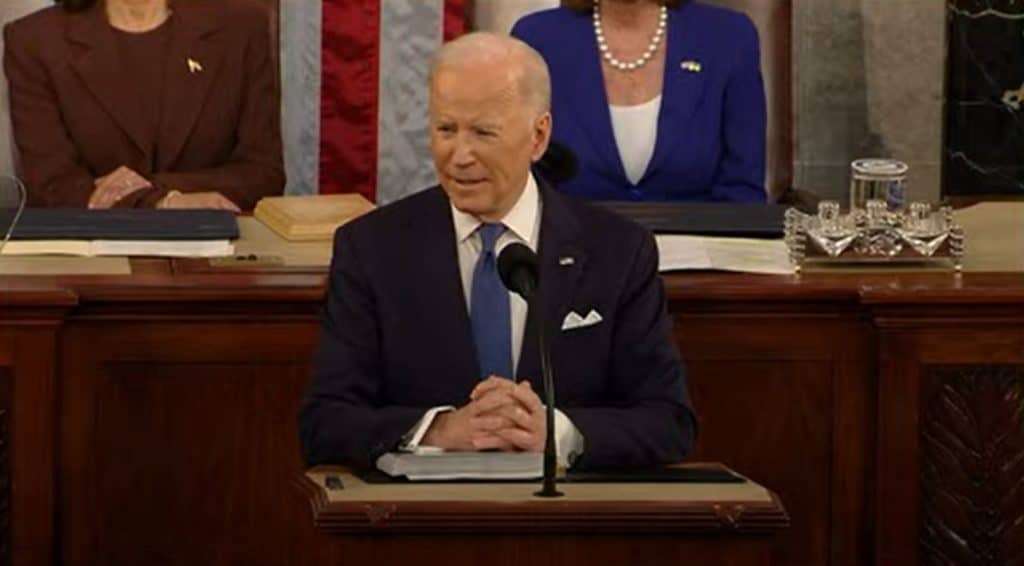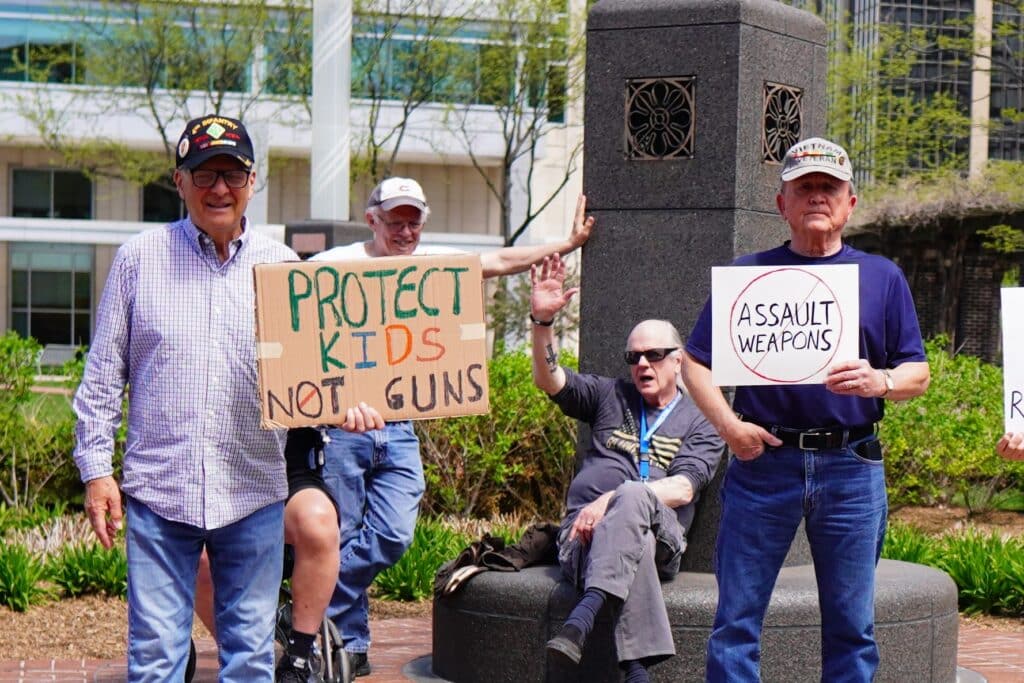The President announced his latest executive action on guns on Thursday. He’s trying to broaden the number of people who have to get a federal license to sell used guns, and therefore perform background checks (among many other things associated with being a licensed dealer).
As you may have noticed, his previous efforts to unilaterally institute new gun restrictions have gone poorly. But there’s reason to think time might be different. The rule is both less ambitious than the previous ones and has at least some Congressional action to potentially stand on.
This week also saw the end of Tennessee’s special session responding to the Covenant School shooting. In the leadup to the session, Republican Governor Bill Lee’s “red flag-esque” proposal got lots of attention. But, as Contributing Writer Jake Fogleman explains, the biggest takeaway from the session was the plan’s total absence.
Plus, Cam Edwards of Bearing Arms joins the podcast to dissect Biden’s new gun rule.

Analysis: Will Biden’s New Gun Action Fare Better Than the Others? [Member Exclusive]
By Stephen Gutowski
President Joe Biden tripled down on using the ATF to try and tighten America’s gun restrictions. His first two tries have faired poorly. Will the latest do any better?
On Thursday, the Biden Administration announced a new ATF rule proposal. This time, the administration is targeting used gun sales. It aims to force more Americans to obtain federal licenses to deal guns or face fines and jail time.
In August 2022, President Biden unilaterally banned “ghost gun” kits. By July 2023, it was stuck down by a federal court. It remains in effect thanks to an emergency stay issued by the Supreme Court, but the rule is facing an uphill legal battle.
In January 2023, the Biden Administration reclassified pistol-brace-equipped guns to make them illegal to own unless registered with the ATF. Only a tiny percentage of Americans complied despite the agency waiving the tax associated with registration. By August 2023, a Fifth Circuit Court of Appeals panel found the rule unlawful.
There’s also the bump stock ban. Former President Donald Trump implemented that, but it was defended in court by the Biden Administration. Unsuccessfully, it should be noted. By April 2023, two federal appeals courts had found it unconstitutional.
These rulings all followed the same basic logic. The ATF exceeded its authority under the law, and it was too inconsistent in applying the law to expect regular citizens to understand and be held to the rules it tried to enact.
The new gun dealer rule is likely vulnerable to the same line of legal attack.
The White House outlined the heart of the new rule pretty well in its release announcing it. It details a series of factors that would require somebody to obtain a Federal Firearm License (FFL) before selling guns. The White House said falling under even one of these could make selling a firearm without a license illegal.
“Offer for sale any number of firearms and also represents to potential buyers that they are willing and able to purchase and sell them additional firearms;” “Repetitively offer for sale firearms within 30 days after they were purchased; Repetitively offer for sale firearms that are like new in their original packaging; Repetitively offer for sale multiple firearms of the same make and model; or as a formerly federally-licensed firearms dealer, sell firearms that were in the business inventory and not transferred to a personal collection at least a year before the sale, addressing the so-called’ fire sale loophole.'”
Although, the rule itself adds some significant caveats to that list. Indeed, some of those exceptions could be read to swallow the guidelines whole.
“[W]hile selling large numbers of firearms or engaging or offering to engage in frequent transactions may be highly indicative of business activity, neither the courts nor the Department has recognized a set minimum number of firearms purchased or resold that triggers the licensing requirement,” the agency wrote in its proposed rule. “Similarly, there is no minimum number of transactions that determines whether a person is ‘engaged in the business’ of dealing in firearms. Instead, the established approach for determining whether an individual is ‘engaged in the business’ is to look at the totality of circumstances. Thus, even a single firearm transaction, or offer to engage in a transaction, when combined with other evidence, may be sufficient to require a license.”
So, how does that square with what federal law says on the topic? Well, the applicable law says dealers need to get an FFL, and a dealer is “any person engaged in the business of selling firearms at wholesale or retail[.]”
It goes on to define the key aspect of being “engaged in the business,” too. That would be somebody “who devotes time, attention, and labor to dealing in firearms as a regular course of trade or business to predominantly earn a profit through the repetitive purchase and resale of firearms[.]” However, it notes that doesn’t apply to somebody “who makes occasional sales, exchanges, or purchases of firearms for the enhancement of a personal collection or for a hobby, or who sells all or part of his personal collection of firearms[.]”
So, many of the base-level requirements may fit the bill. But there are clearly some problems with the vague parts of the proposal. The idea that somebody who has only sold one used gun (or none at all, depending on their intentions) can be charged for not having a dealer’s license seems especially vulnerable to legal challenges. The same is probably true for offering to sell somebody guns again at some point, depending on the circumstance.
And then there’s the issue of the ATF trying to give itself power beyond what it has actually laid out in the rule. They’ve done that in the previous rules, and it’s present here too.
“The activities set forth in these rebuttable presumptions are not exhaustive of the conduct that may show that, or be considered in determining whether, a person is engaged in the business of dealing in firearms,” the ATF wrote in its rule.
However, there are a few reasons to think this rule could fare better than the others.
To start, it’s not as aggressive as the previous rules. It primarily seeks to codify positions the ATF has long held on who needs to get a license to sell guns. They’ve warned selling even one used gun could require an FFL since at least the Obama Administration. And, despite gun-control groups characterizing the rule as closing loopholes, the same requirements outlined in the proposal have always applied at gun shows, online, or anywhere else somebody deals guns as a business.
Unlike the previous rule proposals, this one comes on the heels of Congress taking action in the area. As part of the 2022 Bipartisan Safer Communities Act, lawmakers removed the reference to making a “livelihood” from the definition of what it means to be “engaged in the business.” That leaves some, if not much, room for the ATF to recalibrate its approach to licensing.
Also, there are some court cases dating back to the 1970s where people have been convicted of dealing without a license for some of the reasons outlined in the ATF’s rule. United States v. Gross, United States v. Huffman, and United States v. Wilkening show judges concluded somebody could be required to obtain an FFL if they repeatedly bought and sold several guns for profit or other financial gain in a short period. The sales weren’t the seller’s primary source of income and sometimes didn’t generate much profit (with Wilkening making just $350 in his 1973 case.)
Of course, Congress’s language change was pretty limited. And the federal courts are more skeptical of both the administrative state and government efforts to restrict guns than they were in the 1970s. So, judges today may not come to the same conclusions.
Plus, the initial proposals from the ATF on the “ghost gun” and pistol brace bans were also relatively modest. But they both changed significantly after overwhelmingly negative comments from the industry and the public. And those changes pushed the boundaries of the agency’s power even further into
So, even if the initial dealer license proposal is more modest than the final versions of Biden’s other rules, it probably won’t stay that way. Attempts to push the ATF’s power to decide who needs a license to sell used guns will put the proposal into an ever-worsening legal position.
Podcast: Biden Moves to Expand Who Needs a Gun Dealing License (Featuring Cam Edwards of Bearing Arms) [Member Early Access]
By Stephen Gutowski
This week, President Joe Biden announced new executive action aimed at tightening gun laws.
This time, he wants to expand who must get a license to legally sell used guns. So, I brought back Bearing Arms editor Cam Edwards to review the ATF’s proposed rule.
We go over the new details of what the agency says will trigger the license requirement. Much of the rule codifies what the ATF has claimed for years about who might be prosecuted for selling guns without a license. But Cam notes the agency is seeking to expand its authority, perhaps beyond what’s allowed under the law, even if it’s claiming it will only use that power sparingly.
He said the recent increase in “zero-tolerance” enforcement against licensed dealers could signal bad news for regular people the ATF decides need one too.
The Biden Administration has pointed to changes made to the licensing law in the Bipartisan Safer Communities Act as justification for the new rule. Cam said he’s skeptical that will hold up in court where the other recent Biden executive gun actions have had trouble. But we talk about why things might go differently this time.
Plus, Contributing Writer Jake Fogleman and I talk about how Tennessee shows “red flag” laws have hit a political ceiling.
You can listen to the show on your favorite podcasting app or by clicking here. Video of the episode is also available on our YouTube channel. Reload Members get access on Sunday, as always. Everyone else can listen on Monday.

Analysis: ‘Red Flag’ Laws Hit a Political Ceiling [Member Exclusive]
By Jake Fogleman
Any chance of a so-called red flag law emerging from Tennessee this year was officially snuffed out this week. Its demise signals the policy will have problems expanding to more states.
Despite capturing nearly all of the attention in the run-up to the Tennessee special legislative session, Volunteer State lawmakers adjourned on Tuesday without so much as a debate on Republican Governor Bill Lee’s “temporary mental health order of protection” legislation.
That outcome was not a shock given things had been trending that way in the weeks leading up to the special session’s start date. Still, the fact that a Republican Governor—considered by many to be otherwise staunchly in favor of gun rights—went out on a political limb to call for a temporary gun confiscation bill, with all the potential for backlash that entails, was certainly noteworthy. That his spirited advocacy was not enough to get other Republicans in the ruby-red state on board is even more telling.
Red flag laws have increasingly come under fire from gun-rights advocates and some civil libertarians as they’ve grown in popularity in recent years. Critics charge that the laws infringe on the right to keep and bear arms without a criminal conviction or even a proper civil proceeding because most iterations currently allow a confiscation order to be issued by a judge without the accused party being able to defend themselves or even be present in court in some cases.
Keenly aware of this, Lee went to great lengths to distance his proposal from other temporary confiscation laws, even deliberately avoiding the “red flag” label altogether when promoting it. He also attempted to bolster his proposal with numerous due process protections not found in any other similar law on the books elsewhere in the hopes that might persuade skeptics to get on board. Instead, outside of a small handful of Republican lawmakers and Democrats, Lee’s proposal was widely rebuked by the state’s conservative majority. It was never even brought up for a vote during the special session it was initially meant to be the centerpiece for.
Its fate suggests that no amount of due process considerations or creative marketing can overcome the tainted reputation attached to anything resembling a red flag law in the minds of most gun-rights activists and Republican lawmakers. That inherently limits any hope proponents might have of the policy spreading anytime soon.
Though 21 states plus the District of Columbia have enacted some form of red flag law to date, just two are under trifecta Republican control. And the two red states that did choose to adopt some form of red flag law did so under much different circumstances than red states find themselves in now.
Indiana passed its law back in 2005, becoming just the second state in the country to do so. As an early adopter, it avoided today’s contemporary debate over the law as a hot-button divide between gun-rights and gun-control supporters. And it predated a time when gun politics had almost entirely polarized along party lines.
Florida is the only other red state with a red flag law on the books. And while it adopted one much more recently, in 2018, it did so in a far different political climate than the one in Tennessee. While the state was Republican-controlled in 2018, it was still widely considered a purple state at the time with a swinging electorate to consider. And the Republican control of the state legislature was far less absolute than it is now with its current supermajorities in both chambers. The 23-17 Republican majority in the Senate at the time was as slim as it had been since 1996, and the 73-47 split in the House was as narrow as it has been any time in the state since 1998. Those are clearly very different conditions than the current balance where, much like in Tennessee, Republicans have a stranglehold over the levers of state government and are focused on cranking out gun-rights bills rather than gun control.
Since 2018, the country has also seen an explosion in conservative-leaning state and local governments embracing the “Second Amendment Sanctuary” movement. More than 1,000 counties have now passed resolutions, often in response to red flag legislation. The outcome of the Tennessee special session shows that antipathy toward red flag bills has not receded.
Of the remaining 29 states without a red flag law on the books currently, 21 are under trifecta Republican control. Republicans control both chambers of the legislature in another six states. That leaves Pennsylvania and Maine as the only two states in which Democrats control two or more pieces of the state trifecta that don’t currently have a red flag law on the books, and neither are likely to adopt one in the immediate future.
It’s become abundantly clear that red flag laws, or anything closely resembling them, still aren’t politically palatable in Republican-leaning states. Since that constitutes the vast majority of states without one on the books, it would appear red flag laws have all but run out of room to grow for now.
That’s it for now.
I’ll talk to you all again soon.
Thanks,
Stephen Gutowski
Founder
The Reload






